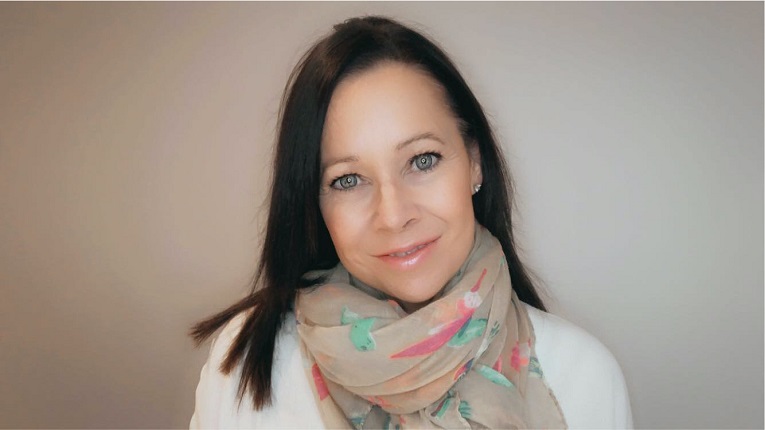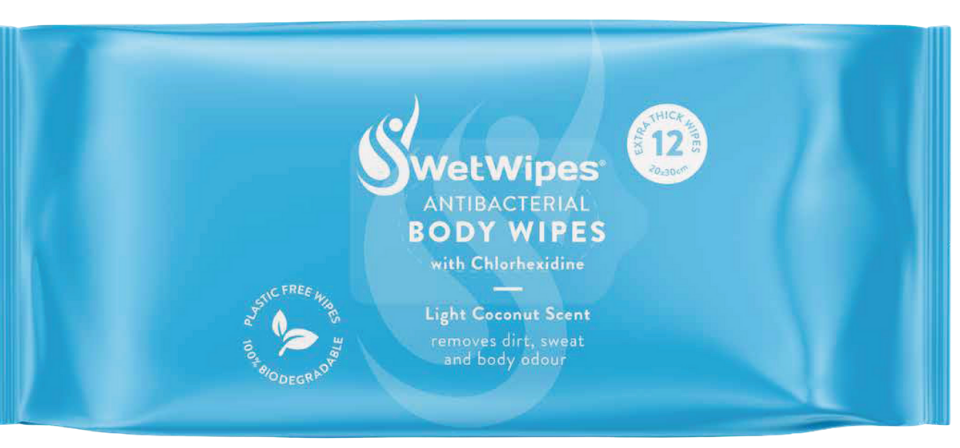The antibacterial body wipes company that pivoted during lockdown

Posted: Fri 19th Feb 2021
Liz Barnes had an unexpected uplift in sales for her body wipes aimed at gym-goers when people started buying anti-bacterial products as the coronavirus pandemic hit.
But as sales slowed down, she discovered a new market and pivoted SwetWipes into targeting the market for disabled and older people who can't easily access showers.
Liz shares the story of the business, how Amazon has been key to its growth and how the Amazon Small Business Accelerator e-learning programme boosted her entrepreneurial knowledge.
How did you come up with the idea for the business?
I was working as a medical rep selling skin disinfection products for use before patients had surgery. If you go into hospital for an operation, they put you to sleep and then they clean you with iodine or chlorhexidine.
While I was a rep chlorhexidine got authorisation from NICE to be used as a gold standard for skin preparation because of its efficacy in reducing the bacterial load on the skin.
I thought what would be really useful is a wipe that wasn't clinical grade wipe but was something that everyone can use. At the time I was running around all over the place trying to squeeze in gym sessions at lunchtime. I thought there are loads of people who cycle or run to work who would like a wipe. They could use it to clean up knowing that they'd reduce the bacteria that causes body odour.
I had 10,000 wipes made and got them delivered into Amazon. Sales were slow to start with but then COVID-19 hit and people started panic buying anything that was antibacterial.
I sold out within six weeks. I ordered some more but by the time they arrived you could get hand sanitiser everywhere so the sales ground to a halt.
I thought "oh no, what have I done? I've just invented something that nobody needs because everyone is stuck at home and they have access to a shower or a bath." But then I get an email from Tabitha Fung, a professional British wheelchair tennis player.
She said my wipes are an absolute godsend because she travels around the world playing tennis but can't often use showers because they're not adapted for disabled people.
I started getting emails from other disabled people saying the wipes are amazing because they can't get to the bathroom. So I thought I'll change tack and instead of going after the sporting market, I'll go after people who physically can't shower.
That's when everything changed. I edited my Amazon listing and launched my website in July last year. Since then, it's gone from strength to strength.
I've now got a raving fan base of elderly and disabled people. It has really opened my eyes because I didn't realise that people were struggling. It is a really under catered for market. Some of these people have carers who clean them. They give my wipes to the carers who love them and say they are so much better than traditional bed bath wipes.
It could all have gone really badly for me if I hadn't changed tack. If I had been dogmatic about it and said "no, this is my target market and this is who I'm going after", I think I would have failed.
How has selling on Amazon helped your business?
I love Amazon! I'm signed up to Amazon Prime and Fulfilment by Amazon which is brilliant because Amazon fulfils the orders for me.
This has enabled me to grow a lot quicker because if I had to fulfil all those orders myself, it would be quite difficult. It's only me in the business at the moment.
I've been growing my sales on Amazon using pay-per-click advertising. It's been a learning process but I'm starting to get results now.
How do you market to your customers?
The bed bath market is usually a very clinical sell by distributors so there's no relationship with the end user. But what I've been doing is using Facebook to start a direct dialogue with customers. They tell me what they need and I'm able to deliver.
People in their 60s are replying to my Facebook ads and saying "these would be great for my mum" and then they show them the ad. Some 80 and 90 year olds are also on the internet and they're buying the products themselves.

How have you financed the business?
I've self-financed it and invested profit back into the company. This is my second business. I grew and sold the first one and did the same thing.
Every time I've got money, I buy more stock. I didn't take a salary for the first year and it's only been the last two months that I took a dividend. I initially ran it alongside being a medical rep.
What are your plans for the future?
I'm keen to get the products on retail shelves. A lot of my customers aren't online but they do go to the chemist so I'd like to get stocked by a major chain such as Boots or Lloyds Pharmacy. My focus is reaching as many people as possible and helping them.
I am also working on some new scented products.
What tips have you picked up from the Amazon Small Business Accelerator e-learning programme?
I watched the video on email marketing. I'm actually already quite good at email marketing because I did it for my old business but it was interesting to watch that as a refresher. I also found the video on improving your search engine optimisation useful.
I also watched the videos covering how to advertise your products on Amazon. As I'm already a pay-per-click user I wanted to pick up some tips on how to optimise the campaigns. I was already running keyword campaigns, but on the back of watching the videos, I set up an automatic PPC campaign.
This allowed me to utilise Amazon's vast array of data and knowledge in order to find new search terms which I could apply to my campaigns. The two big takeaways from this were:
you need to allow at least two weeks for the campaign to run and collect data and
make sure you check back in regularly and find out what is working for you and what is not
By doing this, I have been able to lower my average cost of sale from 40% down to 25%
Which other entrepreneurs inspire you and why?
Sara Blakely from Spanx. I listened to a podcast with her and it was interesting because she started out in a similar way to me, having an idea and doing everything from home.
She talked about how she grew it from her house and how initially it was quite hard and then it really took off. She grew it from nothing to a multi-million pound company.
What are your tips for business success?
The thing I've learned most from running my own businesses is that you can't just look at your bank account and run your business based on what you see in it.
You've got to have a full set of accounts and be looking at that regularly and working out ways to tweak it because it is about profitability at the end of the day. It's really important that you work with a good accountant or become good at it yourself so you can look at your profit and loss and know if it's profitable and worth scaling up.
I think that's a mistake I made with my first business. It was a good lifestyle business but I was never going to be able to scale it up because the profitability wasn't there.
Secondly, I think it's important to know what you don't know. In areas where you're weak, you need to buy in talent or advice.
Wherever I think I haven't got the time or the resources to do something, I'll seek advice and ask other people. You can't possibly do everything yourself, especially when you're starting out on your own.
Need help with building your dream business?
No problem! As an Enterprise Nation member, you'll get free access to in-depth resources on everything from business plans and marketing to finance and sales. Join today for the full range of member benefits!
Get business support right to your inbox
Subscribe to our newsletter to receive business tips, learn about new funding programmes, join upcoming events, take e-learning courses, and more.
Start your business journey today
Take the first step to successfully starting and growing your business.
Join for free

